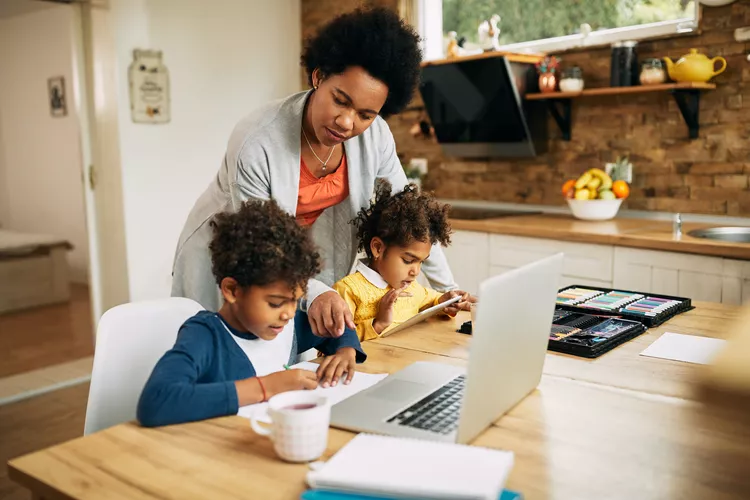Home Schooling

What if Education Switched to Complete Home Education?
Excerpt: Imagine a world where all learning happens at home, and children spend more time with their families while learning important skills and values. This idea became popular during the COVID-19 lockdown, and many wonder if it could become the new normal. Let’s explore how online education could change the way children learn and live.
Benefits of Home Education
- More Family Time: Home education allows children to spend more time with their parents and siblings. This strengthens family bonds and helps children learn family values, culture, and traditions. For example, a child may learn how to cook traditional dishes from their grandparents or listen to family stories that connect them to their roots.
- Flexible Learning: Children can learn at their own pace with online education. They don’t have to follow the same strict schedule as in schools. This flexibility helps children to focus on subjects they enjoy and explore their interests, like art, science experiments, or even coding.
- Cultural Learning: Since children are at home, they can learn cultural practices, festivals, and local traditions in real-time. For instance, a child living in a neighborhood may participate in community events like Diwali celebrations or local fairs, which helps them understand their culture better.
Learning Social Activities in Communities
One common concern with home education is that children may miss out on social activities. However, there are ways to help them adapt and socialize with others in their community.
- Neighborhood Playgroups: Parents can organize regular playgroups with children in the neighborhood. This helps children make friends, practice teamwork, and learn how to share. For example, they could set up sports games or art activities with friends, which boosts social interaction.
- Community Events: Many neighborhoods have events like cultural festivals, clean-up drives, or sports days. Participating in these events gives children a chance to interact with others, develop communication skills, and learn about teamwork. It also gives them a sense of belonging in their community.
- Volunteering: Encouraging children to volunteer for community projects helps them learn responsibility and empathy. For example, they could help plant trees in the local park or participate in charity events, which teach valuable life skills and build social connections.
Guidance and Techniques for Adaptation
- Set a Routine: Even though online education is flexible, setting a daily routine helps children stay organized. A structured day with time for studies, play, and family activities keeps them balanced.
- Create a Learning Space: Having a dedicated learning space at home, free from distractions, can help children focus better. This can be as simple as a quiet corner with a desk, books, and a computer.
- Encourage Hobbies: Children can use their extra time at home to explore hobbies like painting, dancing, or music. Hobbies not only help in relaxation but also build creativity and problem-solving skills.
- Encourage Peer Interaction: Online education doesn’t mean children can’t interact with peers. Organizing virtual study groups or online hobby clubs allows children to connect with their classmates and share ideas.
The Evolution of Online Education Post-COVID-19
The COVID-19 pandemic pushed schools to shift to online learning. Suddenly, millions of students around the world were attending virtual classes from their homes. Although this switch was unexpected, it taught us a lot about the benefits and challenges of home education.
Advantages of Online Education During COVID-19
- Safety and Health: Children could stay safe at home while continuing their education.
- Access to Global Resources: With the internet, children could learn from a wide range of online resources like videos, games, and educational websites.
- Personalized Learning: Teachers could tailor lessons to the individual needs of students using technology.
Challenges of Online Education
- Lack of Social Interaction: Some children missed interacting with their friends and teachers.
- Screen Time Concerns: Too much time spent in front of screens affected the health of some students.
Best Practices for Home-Based Learning
- Limit Screen Time: While online education requires using a computer or tablet, it’s important to balance screen time with offline activities like reading books, playing outdoors, or doing crafts.
- Use Educational Apps: There are many great apps and websites designed to make learning fun. For example, apps like Duolingo (for learning languages) or Khan Academy (for subjects like math and science) can help children stay engaged.
- Encourage Outdoor Activities: Even though children are learning at home, outdoor play is still important. Going to the park, riding bicycles, or simply taking a walk in the neighborhood helps children stay active and healthy.
Conclusion
Switching to full-time home education may seem like a big change, but it offers unique opportunities for children to learn from their families and communities. By blending online learning with real-life experiences and social activities in their neighborhood, children can develop a balanced education that prepares them for the future. It’s important to use the lessons from the COVID-19 lockdown and create a system that keeps children connected, curious, and culturally aware.
External Resources
- Khan Academy – Free online courses for various subjects.
- Duolingo – A fun app for learning new languages.
- TED-Ed – Educational videos for students on a wide range of topics.







